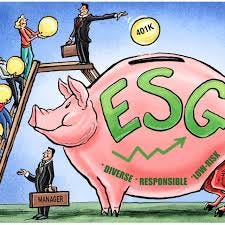Friends,
For nearly two decades, major corporations have touted principles known as E.S.G. (short for environmental, social, and governance factors), ostensibly by focusing their businesses on these concerns as well as on profits.
But now Republicans are taking aim at this approach, calling it “woke capitalism” and using it to demonstrate that Democrats and progressives are trying to impose their views on the rest of society.
In other words, the fight over E.S.G. is extending America’s culture war into the C-suites of big American corporations.
On Wednesday, Senate Republicans, helped by two Democratic defectors, voted to block a Labor Department rule allowing retirement plan managers to include E.S.G. considerations in their investment plans. The vote is likely to draw President Biden’s first veto.
Republicans are right about E.S.G. — but for the wrong reason.
The problem with E.S.G. isn’t woke capitalism. It’s corporate capitalism. Corporate money has corrupted American politics so much that our democracy cannot effectively deal with environmental and social concerns.
CEOs and pension fund managers who tout their records on E.S.G. are engaged in a kind of social greenwashing — designed to burnish their brands and attract investors (including retirees) who want to believe they’re doing good while they’re also doing well.
But most of this is baloney. Investors don’t want to do good at the expense of doing well. They’re unwilling to sacrifice shareholder returns to advance their environmental and social values. They want high returns and they want environmental and social goals. But they can’t have both. They’d do more good by donating to nonprofits seeking to protect the environment and advance the social causes in which they believe.
Corporations and institutional investors won’t deviate from maximizing short-term profits and shareholder returns unless they are required to do so by law. And even then, only when the penalty for violating the law multiplied by the probability of getting caught is higher than the profits from continuing with the illegality.
When I was secretary of labor, big corporations would violate laws on worker safety, wages and hours, and pensions whenever doing so was cheaper than obeying the law. And they’d fight like hell against such laws to begin with, all the while telling the public what wonderful citizens they were.
The soothing corporate and Wall Street talk about E.S.G. is designed to forestall such laws by creating the false impression that corporations are already doing what needs to be done for the environment or social issues, so there’s no need for more laws or regulations.
In 2019, the Business Roundtable — one of Washington’s most prestigious corporate groups — issued a widely publicized statement expressing “a fundamental commitment” to the wellbeing of “all of our stakeholders” (emphasis in the original), including employees, communities, and the environment. The statement was widely hailed as marking a new era of E.S.G.
Since then, the Roundtable and its members have issued jejune statements about all they’ve done to reverse climate change and alleviate poverty.
Not incidentally, these were priorities in President Biden’s “American Families Plan” and “Inflation Reduction Act.” But the Business Roundtable didn’t lobby for these bills. It lobbied against them. Hypocrisy? Only if you believed the Roundtable rubbish about corporate social responsibility and E.S.G. in the first place.
The pressures on companies to maximize their profits and share values — social responsibility and E.S.G. be damned — are coming from shareholders, top executives (whose pay is linked to stock performance), and retirement plan managers, even those who tout their commitment to E.S.G.
It’s tempting to chalk this up to “greed,” but neither corporations nor retirement plans are capable of such emotions. They aren’t people, no matter what the Supreme Court says. They’re bundles of contracts. The specific people who enter those contracts on behalf of corporations, shareholders, and retirees have no interest or expertise in the environment or in any particular social issues. They’re simply doing what they understand to be their jobs — maximizing shareholder value.
If we want these transactions to be better aligned with public needs rather than private profits, laws must demand this, and penalties for violating laws must be increased. Corporate taxes must rise to fund public investments in non-fossil fuels and social safety nets. Regulations must be strengthened to protect the public.
But laws and regulations won’t do any of this if corporations continue to spend vast sums on politics.
The most telling trends over the last three decades have been the growing share of the economy going into corporate profits — generating ever-greater compensation packages for top executives and ever-higher payouts for investors — and the declining share going to most Americans as wages and salaries.
Much of the reason is the vast increases in corporate and Wall Street money flowing into the campaigns of lawmakers who cut corporate taxes, enact corporate subsidies, and block or dilute regulations.
The divisive blather over E.S.G. is simply masking these trends.
The most socially responsible action pension plans and corporations can take to allay environmental and social problems is to refrain from putting money into politics and to support campaign finance reform.
What do you think?














Share this post